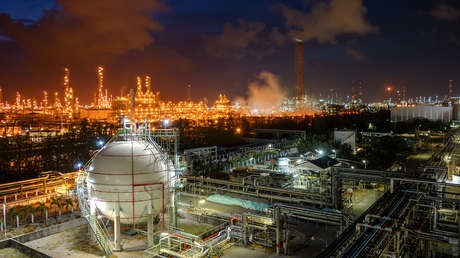Published:
Jan 16, 2023 10:30 GMT
Moscow managed to increase exports of liquefied natural gas by 8% to 46,000 million cubic meters, reported Russian Deputy Prime Minister Alexander Novak.
Russian Deputy Prime Minister Alexander Novak has reported this Monday in the framework of a government meeting that the country’s income from the sale of gas and oil grew by 28% in 2022, despite the wave of sanctions imposed against Moscow for its military operation in Ukraine.
“Regarding the oil industry, here too we recorded a positive result last year, despite the actions of unfriendly countries and sanctions. Oil extraction last year was 535 million tons, 10 million more than in 2021, that is, an additional 2%. Exports also grew by 7%,” said Novak.
The senior official also reported that in 2022 Moscow managed to increase exports of the liquefied natural gas 8% up 46,000 million cubic meters, while pipeline gas deliveries declined due to sanctions and sabotage of the Nord Stream pipelines. He also stressed that Russia supplied a record figure of 15.5 billion cubic meters of gas to China via the Fuerza de Siberia gas pipeline, which represents an increase of 49% compared to the data for 2021.
On the other hand, the Russian deputy prime minister indicated that, despite the drop in coal exports by 7.6% in annual terms, the extraction of this natural resource increased by 0.3%, while supplies in the internal market increased by 6.8%. Novak linked the decline in exports to the embargo introduced in August by the European Union.

Summarizing the activity of the Russian energy sector in 2022, he mentioned that the industry managed to withstand difficulties. The senior official stressed that the industry in question demonstrated “stable work, resistance to external challenges, [y] the capacity to guarantee the energy security” of the country.
- An EU embargo on Russian maritime supplies of oil is in force as of December 5, although the measure includes several exemptions. From the same date a stop To the price of Russian crude, fixed at 60 dollars per barrelby the Group of Seven, the community bloc and Australia.
- At the end of December, Russian President Vladimir Putin signed a decree that prohibits supplying oil to countries that have joined the measure. The mandate will come into force on February 1, 2023 and will remain in effect until July 1, 2023.
- Among other provisions, it establishes that deliveries of Russian crude and petroleum products, which are prohibited under the decree, can be authorized with a special permission from Putin.













